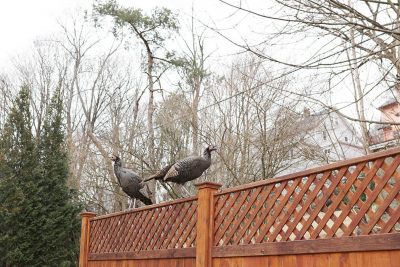
Across the Commonwealth, fowl play may soon be on the rise.
The Massachusetts Division of Fisheries and Wildlife is considering raising the annual limit on turkey hunting from two birds per hunter to three birds. The raise to the limit comes as Massachusetts’ wild turkey population continues to rise after their reintroduction into the wild four decades ago after.
If the changes are approved, hunters will be allowed to hunt two male turkeys in the spring and one male or female turkey in the fall. Additional proposed changes include allowing hunters to hunt two birds in a day during the spring, expanding the turkey bowhunting season and adding additional hours to the Youth Day turkey hunt, according to MassWildlife spokesperson Marion Larson.
As Massachusetts considers adjustments to turkey hunting regulations to manage population growth, advancements in optics for hunting continue to enhance the experience for sportsmen. Modern optics technology has revolutionized the way hunters approach their craft, offering precision and clarity that improve accuracy and ethical hunting practices. High-quality scopes and sights not only aid in locating targets but also ensure humane and effective shots, aligning with conservation efforts and sustainable hunting practices.
Moreover, the evolution of optics & sights for hunting extends beyond traditional rifles to include advancements in bowhunting equipment. Hunters can now benefit from specialized bow sights that optimize accuracy at varying distances, catering to the diverse terrain and conditions found throughout Massachusetts. These innovations not only support increased hunting opportunities, such as expanded bowhunting seasons, but also promote safety and proficiency among hunters, aligning with the state’s commitment to responsible wildlife management.
“We have a very abundant population of turkeys in Massachusetts,” Larson said, “and considering the various options that were available, our biologists felt that these kinds of proposals were well in-line and would not impact, would not be detrimental to the turkey population, due to their abundance and very good reproductive rate every year.”
Ken Brown, vice president of the Massachusetts Bowhunters Association and a self-proclaimed avid turkey hunter, said turkey hunting is necessary in places such as Massachusetts because humans have largely driven the bird’s predators out of the state.
“Coyotes, mountain lions, wolves, bears — those are natural predators to game species,” Brown said. “We’ve basically removed those predators in most areas because us living in harmony with those species hasn’t necessarily been an easy thing to do. Hunters play the role of predator in terms of population control.”
Brown said the turkey’s population had risen to such an extent that rogue birds were beginning to become a hazard to both drivers on the road and other species in the wild.
“In fact, I think probably you’re helping to strike a reasonable balance between turkey populations and other populations,” Brown said. “And I do think turkeys may even be competing with other species for food sources.”
Drew YoungeDyke, senior communications coordinator for The National Wildlife Federation, said while much of America’s wild turkey population had been hunted nearly to extinction, repopulation efforts in the 1970s have been a “tremendous success story.”
“Through specific conservation efforts largely funded by hunters and hunter organizations, … turkey populations and wild turkey populations have recovered,” YoungeDyke said, “and in some areas of the country, are even higher than they would have been before their populations were originally reduced.”
Brown said the majority of the funding for these conservation efforts is collected through both a federal general excise tax on hunting-related gear and fees associated with obtaining the various permits needed to hunt in Massachusetts.
“Sportsmen in Massachusetts imposed a tax on themselves in the form of the Massachusetts Wildlife Stamp,” Brown said. “… The proceeds from that wildlife stamp are used to purchase land through the Department of Conservation and Recreation for habitat protection.”
Larson said the positive impact of hunters extends far beyond turkey conservation as these funds enable a variety of different conservation projects at MassWildlife.
“[Hunters] are directly helping, they are making a very direct contribution to wildlife conservation,” Larson said. “It’s not just for turkeys, it’s for all kinds of wildlife. In a lot of cases, the kind of work that we’re doing is helping a whole bunch of different wildlife, including turkeys.”
Christopher Kornichuk, 28, of Brighton, said he thought raising the turkey hunting limits made sense and that hunting overall was an important right that should not be oppressed.
“It’s like a very primal thing, which I think people should be free to exercise,” Kornichuk said. “Second of all, I think its freedom to own their own guns and freedom to sustain themselves, as well.”
Allston resident Maggie Wierzbowski, 20, said while she was not familiar with Massachusetts’ turkey situation, she did not support hunting in general because of her vegan beliefs.
“I’m not a hunter, I kind of object to hunting, but I know that people do that anyways,” Wierzdowski said. “Just because I live a vegan lifestyle. My diet is not vegan, but I try not to contribute to using animal products when I don’t have to.”
Derek Scolaro, 27, of Brighton, said that because his father was a hunter, he was accustomed to the hunter’s lifestyle and that regulated, responsible hunting of both turkeys and other wildlife posed no problem to the species.
“There’s two sides of this,” Scolaro said. “There’s hunting for game, and then there’s hunting for food. I think in our society we’ve kind of lost the need to hunt for anything other than sport unless you live in places like Alaska. I would say that hunting overall, as long as you’re following our laws and doing our thing, I have no problem.”
Larson said MassWildlife will hold public feedback sessions on Feb. 7 in Westborough and on Feb. 13 in Palmer. Residents can also comment online at MassWildife’s website.


















































































































Missy • Jan 30, 2019 at 7:06 am
Great honest informative article.